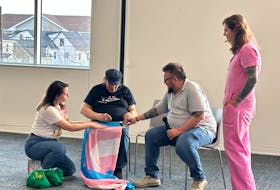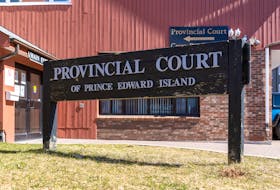Rosemary Driscoll of Hazelgrove watched the love of her life die of pancreatic cancer.
Driscoll met Dr. David Richardson through a community orchestra. They instantly connected and had their first date on Sept. 23, 2011.
A week later, Richardson was diagnosed with Stage 4 pancreatic cancer.
“He had such a zest for life that it was inconceivable that the cancer was going to take him and I just believed he was going to be one of those rare cases that he was going to survive,” said Driscoll, with tears in her eyes. “I never looked at him as dying man, I saw him as someone who was very much alive.”
Richardson eventually lost his battle to the deadly cancer on March 14, 2013.
“It was hard,” said Driscoll. “It was hard to see him in pain. It was also frustrating knowing that there just didn’t seem to be much hope and yet I never gave up hope and that was the only thing that got me through it.”
Driscoll was one of approximately 200 people who took part in the ‘Light Up the Lake’ run in Charlottetown Saturday to raise awareness and funds for pancreatic cancer research, hosted by Craig’s Cause Pancreatic Cancer Society.
Stefanie Condon-Oldreive, the founder and director of Craig’s Cause Pancreatic Cancer Society, started the foundation after watching her own father (Craig) battle pancreatic cancer.
He died following complications from the Whipple procedure, a procedure that removes the head of the pancreas, most of the duodenum (part of the small intestine), a portion of the bile duct- and occasionally- a portion of the stomach.
Pancreatic cancer has a poor prognosis. In 2017, it is projected that 5,500 Canadians will be diagnosed with pancreatic cancer and 4,800 will die from the disease, according to statistics from the Canadian Cancer Society.
It is the fourth leading cause of cancer-related deaths in the country and is projected to take more lives than breast cancer by 2020.
Condon-Oldreive said the foundation has so far raised $2 million with 100 per cent of the funding going towards awareness, education, support and research.
Teresa Doyle of Ten Mile House is a pancreatic survivor who also took part in the event Saturday.
She was first diagnosed with pancreatic cancer in 2010 and underwent the Whipple procedure as well as chemotherapy.
Doyle says with a big smile that she has been cancer free for three years.
“I’m just so thankful to be alive,” said Doyle, who was helping organizers at the event. “It’s a really good feeling.”
As she ran the 5 kilometres along the Confederation Trail, Driscoll said she will be thinking about Richardson and honoring his memory.
Knowing the signs and symptoms
- Yellowing of the skin and the whites of the eyes (called jaundice)
- Pain in the upper abdomen or upper back
- Fatty stools (called steatorrhea) that are light coloured, bulky and float in the toilet
- Unexplained weight loss
- Loss of appetite
- Fatigue
- Nausea and vomiting
- Indigestion
- Feeling full after a small meal
- Bloating
- Gas
- Diarrhea or constipation
- Itching
- Dark urine
- Fever and shivering
- Swelling of the legs
Source: http://www.cancer.ca
FACT BOX
Abraxane is a prescription medication used to treat metastatic pancreatic cancer. However, it is not currently available on P.E.I.
It doesn’t cure pancreatic cancer, but for many patients it improves their quality of life.
Stefanie Condon-Oldreive, founder and director of Craig’s Cause Pancreatic Cancer Society, recommends Islanders reach out to Robert Henderson, the minister of health and wellness, to ask for Abraxane to be approved for P.E.I.
Twitter.com/MaureenElizaC









